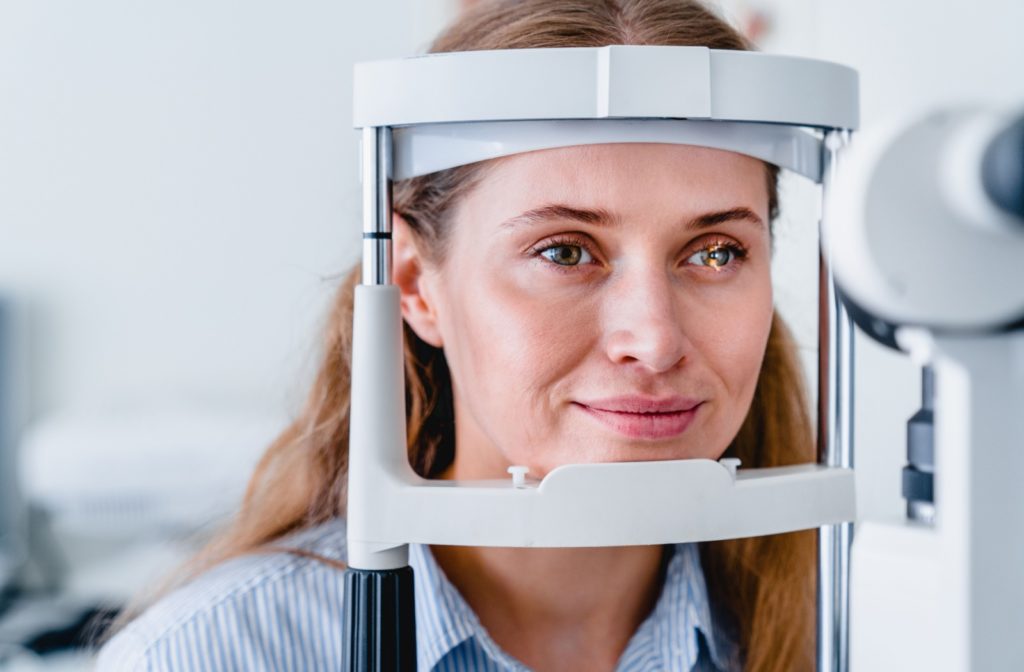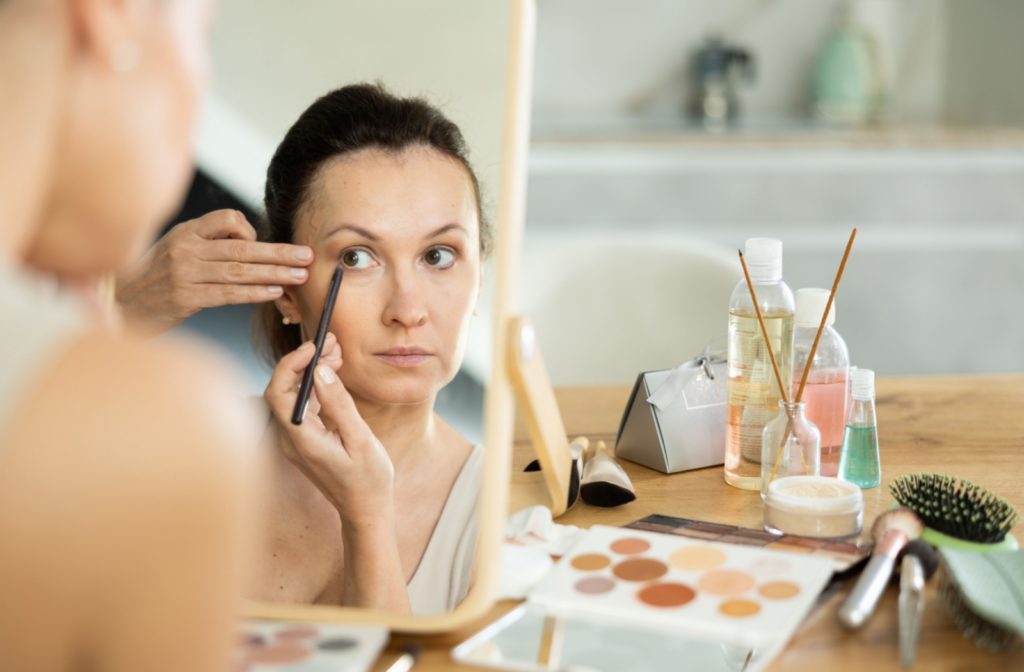Eye exams are key for maintaining good ocular health. To make the most of your annual visit, consider preparing for your eye exam to confirm an accurate health assessment of your eye and for a smooth experience.
Wearing makeup to your eye exam isn’t ideal, but it’s okay. Wearing heavy eye makeup can flake into your eyes during your visit, affecting the accuracy of your health examination. If you’re on a day out, and have makeup on for your visit, opt for wearing minimal eye makeup.
You can maintain good eye health while wearing makeup by incorporating the following in your daily practice:
- Always remove your makeup thoroughly before bed.
- Use high-quality, hypoallergenic products.
- Replace your makeup regularly to avoid bacterial buildup.
- Avoid sharing makeup to reduce the risk of infections.
Importance of Routine Eye Exams
Routine eye exams are important for everyone, not just those who wear glasses or contact lenses. It’s recommended that adults between the ages of 18 to 64 visit their optometrist once a year for their eye exam.
Eye exams help monitor changes in your vision prescription, ocular health, and general health. Many medical conditions like diabetes and high blood pressure can present initial symptoms in the eye, which can be detected during an eye exam.
Eye exams aren’t just about vision correction; they’re a form of preventive care.
Regular check-ups can identify conditions such as glaucoma, cataracts, and macular degeneration before they become complicated. Detecting these issues early can make treatment more effective and less invasive.
Can I Wear Makeup to an Eye Exam?
Many beauty lovers may wonder whether wearing makeup to an eye exam may cause issues during the visit. In short, the answer is “kind of”. You can definitely wear makeup to your visit, but be mindful of makeup around the eyes!
Eye makeup, like mascara, eyeliner, and shadow, can interfere with some of the tests your eye doctor can perform and ruin the condition of your makeup altogether. Plus, your lashes may in the way of certain tests, such as:
- The preliminary testing,
- The slit lamp examination
- Retinal photos
- Your contact lens fitting
This is why it’s suggested to go with minimal or no makeup to prevent difficulties during your visit.
If you’re keen on wearing makeup to your visit, that’s okay! But, consider making some adjustments to your regular makeup routine. Wear minimal eye products, consider wearing non-waterproof mascara, and avoid eyeliner and eyeshadow.
Waterproof formulas are designed to withstand moisture and tears, making them harder to remove. This may interfere with your exam, especially if any tests during your visit require adding drops to your eyes. Choosing a non-waterproof formula helps avoid this concern.
Eyeliner and eyeshadow can smudge or flake into your eyes, complicating what the optometrist may be able to see during the slit-lamp exam and can cause eye irritation during your visit.
Skin products like foundation and concealer are less of a concern to wear to your eye exam, but they can migrate into your eye, causing temporary blurriness and discomfort. Fortunately, lip products are safe to wear during your visit!

How Does Wearing Make-up Impact Eye Health?
Wearing makeup, especially around the eyes, can pose certain risks to eye health.
Contaminated makeup products can introduce bacteria and lead to infections, such as conjunctivitis and styes. Plus, products that are too heavy or improperly applied may cause irritation or allergic reactions, exacerbating conditions like dry eyes.
If eye makeup isn’t consistently and thoroughly removed, the residue can clog meibomian glands affecting the stability of the tear film. When these glands along eyelids are clogged, oil secretion that’s necessary to prevent tear evaporation is reduced, which can lead to dry eyes.
Plus, makeup residue can obstruct the eyelashes’ natural function of keeping debris out of the eyes, potentially leading to further irritations or infections.
Tips for Makeup Wearers
When using makeup, especially eye products, it’s important to be mindful of hygiene and application techniques.
Always make sure that your hands are clean before applying makeup, and avoid sharing products with others, to reduce the spread of bacteria. Be regular in cleaning your makeup tools like brushes and sponges. It’s recommended to wash your tools every 7 to 10 days. When these tools are left uncleaned for long periods, the residue can irritate your eyes and skin.
For those with sensitive eyes or contact lens wearers, consider using hypoallergenic and non-comedogenic (makeup that won’t clog your pores) formulations.
Regularly check the expiration dates on products and replace them as needed to prevent using old or potentially harmful items. Using expired products can pose risks to your eye health. Over time, cosmetic products can harbor bacteria and other harmful microorganisms that thrive in their formulations.
Applying these contaminated products to your eyes and skin can lead to a risk of developing infections around the eyes like conjunctivitis or styes, leading to severe discomfort.
Moreover, makeup ingredients can degrade over time, which may cause skin irritation or allergic reactions, especially for sensitive skin around the eyes. If you experience symptoms like redness, itching, or excessive tearing, it may indicate that your makeup has expired.
To protect your eyes and overall health, it’s important to regularly check the expiration dates of your makeup and replace any products that are past their prime.
Makeup products should be replaced regularly to maintain good eye health. Products like mascara and eyeliner should be replaced every three months to reduce the risk of bacterial growth in these products. Cream eyeshadows should be replaced every six months, while powder products can last up to a year if stored properly.
Schedule an Appointment
Having healthy eyes doesn’t mean you can’t enjoy wearing the makeup you’d like. Wearing minimal eye makeup makes it easier for your optometrist to thoroughly assess your ocular health.
Connect with our team at Total Vision La Mesa to schedule a visit for your routine eye exam.



